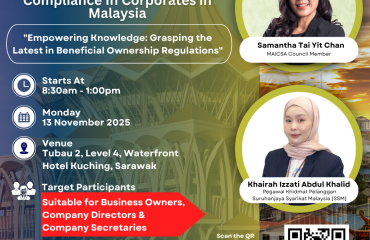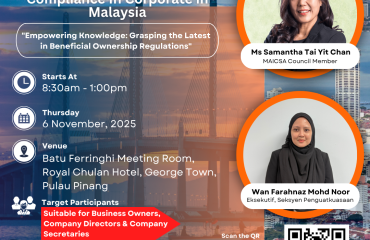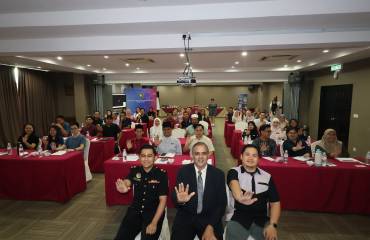
A very good morning to YBhg. Tan Sri Tan Sri / Datuk Datuk / Ladies and Gentlemen:
The “Unmask The Corrupt” campaign is Transparency International’s 24-month campaign aiming to end the secrecy that aids and abets shifting the proceeds of corruption across borders. Money and power are not anonymous, nor should they be. Unmask the Corrupt campaign targets impunity for corruption at both the systemic level and at the individual level by reducing the ability of the corrupt and those who facilitate their actions to engage in cross-border transfer and use of illicit assets.
We at Transparency International believes that people, whose income or wealth acquired through stealing public money, or by accepting bribes from domestic and international corporations, should face consequences. They should be prosecuted where possible and governments must end such individuals’ ability to transfer and hide illicit funds across international borders.
Many governments agree, but much remains to be done.
Transparency International is alarmed that banks, real estate companies, sellers of luxury goods such as jewellery, paintings, watches and yachts, and others, are enabling criminal behaviour by accepting such illicit or stolen money in payment for goods, services and investments. We further contend that many governments responsible for protecting the public from such criminal acts are sometimes too complacent resulting in de facto support for impunity for corruption. It is ordinary people, meanwhile, who suffer everyday as a result through the loss of funds intended for health, education and other economic and social rights.
According to Global Financial Integrity report, in 2011, the developing world lost over 946 billion US Dollars to illicit outflows, representing an increase of nearly 14 per cent over 2010. This figure is more than seven times the total inflows of international aid they received that same year.
In the UNODC’s, report on “Illicit Financial Flows” in 2011, global detection rates of illicit funds by law enforcement are estimated to be as low as 1 per cent for criminal proceeds and the seizure rate is thought to be even lower, at 0.2 per cent. The authorities need to employ cutting edge technology to arrest the corrupt.
Impunity for corruption also inflames and deepens the conflict between private interests and the public interest. The flaunting of lavish lifestyles by those who appear to have gained their wealth illicitly, juxtaposed with the limited enjoyment by ordinary people of basic rights such as health and education, heightens public anger.
Money Laundering
In order to ensure that corruption cases are effectively prevented, exposed, and investigated and that corrupt individuals are sanctioned, it is instrumental that international community closes structural loopholes that currently allow corrupt individuals to remain unpunished. Tackling illicit flows is an essential dimension of this process to ensure that corrupt individuals cannot hide and enjoy the proceeds of corruption.
Money laundering allows public officials and other criminals around the world to smartly re-integrate stolen assets into the global financial network in a manner that does not raise suspicion. Within this framework, the fight against corruption and the fight against money laundering are intertwined.
The United Nations Conventions against Corruption (UNCAC) also encourages signatory parties to institute a comprehensive regulatory scheme to prevent money laundering, including measures to support the identification and monitoring of politically exposed persons.
In addition, strengthening regulations on banks and their integrity practices may also be helpful to enhance transparency in the financial sector, uncover corrupt practices and make it difficult to launder the proceeds of crime.
Transparency International, as part of its Financial Integrity Initiative, is developing a Financial Integrity Assessment tool. The tool aims at analysing in detail the elements of a financial integrity system, assessing variation in integrity between institutions as well as improvements over time in its Strategy for 2013-2014.
Ladies and Gentlemen:
The Transparency International movement has been advocating for improved standards on anti-money laundering as well as reforms in individual countries in a variety of ways.
For instance, through its G20 work, Transparency International is actively advocating for the G20 to take action against corruption through enforcement of anti-money laundering regulations, facilitation of stolen asset recovery and measures to address conflicts of interest in the financial sector.
Another example is more recently, Transparency International in the United Kingdom has emphasized the importance of the G8 to take action on money laundering. The chapter wrote a letter to the Prime Minister on G8 priorities in 2013 underscoring the importance of passing stricter rules regarding beneficial ownership and taking measures to prevent corrupt money from being hidden in the UK territories.
Tax Havens, Secrecy and Corruption
Secrecy jurisdictions hinder investigations, facilitating illicit money flows and foster criminality and corruption.
Take Labuan as an example. Labuan is ranked at 12th position on the 2013 Financial Secrecy Index. This ranking is based on a combination of its secrecy score and a scale weighting based on its share of the global market for offshore financial services.
Labuan has been assessed with 80 secrecy points out of a potential 100, which places it towards the top end of the secrecy scale.
Labuan only account for less than 1 per cent of the global market for offshore financial services, making it a tiny player compared with other secrecy jurisdictions. Labuan’s 80 per cent secrecy score shows that it must still make major progress in offering satisfactory financial transparency. If it wishes to play a full part in the modern financial community and to impede and deter illicit financial flows, including flows originating from tax evasion, aggressive tax avoidance practices, corrupt practices and criminal activities, it should take action on the points noted where it falls short of acceptable international standards.
A number of measures can be implemented to ensure that money from corruption and illegal activities are not hidden in such jurisdictions, including:
- The adoption of rules requiring transparency of beneficial owners;
- The enactment of clear accounting standards;
- The establishment of rules requiring greater cooperation on tax matters.
1. Beneficial ownership
Financial institutions, including banks, are required to identify their customers as part of their account opening due diligence, but the actual customer is often hidden behind shell companies and trusts. Identifying this individual is key to determine whether the source of funds is legitimate or otherwise.
Good practice requires that beneficial ownership and control of companies, trusts and foundations be readily available on public record to facilitate effective due diligence. In addition, financial institutions, as part of their due diligence, should identify the ultimate beneficial owners or controllers of any company, trust or foundation seeking to open an account.
Few jurisdictions require companies to share information on beneficial ownership with their national authorities and currently no country makes this information freely available to the public. According to the OECD, 16 of the 21 EU countries that are a member of FATF are either non-compliant or partially compliant with its recommendation on corporate beneficial ownership, and none are fully compliant regarding beneficial ownership of other legal arrangements such as trusts.
Shell companies, secrecy jurisdictions and opaque corporate ownership structures allow the corrupt to hide their ill-gotten wealth. It’s time for governments to unmask the corrupt and publicly reveal who really benefits from every company registered on their soil.
A recent World Bank report said that among the 213 cases of grand corruption over the last 30 years studied, more than 70 per cent showed ownership of the stolen funds had been disguised through the misuse of corporate entities, half of which were anonymous shell companies.
It’s not just tropical tax-havens. Secrecy rules also prevent the publication of key information in financial centres such as the UK and the American states of Nevada, Wyoming and Delaware. In the state of Delaware, it has more company addresses than people (945,326 company addresses to 897,934 of total population)
Transparency International also recommends that firstly: Governments should ensure that law enforcement has access to beneficial ownership information without having to tip off the company that the information is being sought.
- As an interim step, governments must require companies bidding for government contracts to disclose their beneficial ownership and the use of proxies. This helps ensure corrupt officials are not awarding themselves or their friends’ government contracts without proper scrutiny.
- Investigate information on beneficial ownership of companies are freely and publicly in machine-readable formats. As a first step towards full disclosure, all collected information should be shared with law enforcement bodies.
- Countries with influence over secrecy jurisdictions such as Hong Kong, the UK in the case of the Cayman Islands or Jersey, to name just a few, should push them to establish public registers of beneficial ownership.
- Ultimately, public records are not the only solution. Banker, lawyers, accountants and others who must themselves be ethical, ensure they do proper background checks and due diligence on the people and companies they work with
2. Accounting Standards
In order to prevent tax evasion, which constitutes a great part of international accounting standards should require multinational companies to be more open about their financial affairs and publish data on every country where they operate.
Ladies and Gentlemen:
Country-by-country reporting also allows citizens to evaluate the behaviour of a company operating in their country and to determine how much the company is contributing to public budgets and most importantly for purposes of exposing corruption, whether or not the company has any special attractive deals with the government. However, this can only happen if the information is made available to the public in a user-friendly ad timely manner.
In 2012, Transparency International published the report “Transparency in Corporate Reporting (TRAC)” analysing the transparency of corporate reporting on range of anti-corruption measures, including country-by-country, among the 105 largest publicly listed multinational companies. This includes Petronas which scored in the top 5 but scored very low for country-to-country reporting. Local corporations are encourage to follow the footsteps of Petronas but increase country-to-country reporting.




